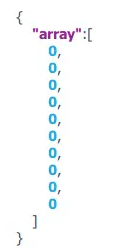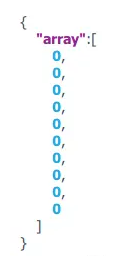Golang 中 omitempty的作用
前言
在尝试将结构体序列化为 Json 时,你可能会遇到 “omitempty” 标记,本小记就来浅看一下它如何起作用。
先上结论:
- 基本类型的默认值会被 omit,除了数组。
- 指针类型为 nil 时会被 omit。
Talk is cheap. Show me the code.
package main
import (
"encoding/json"
"errors"
"fmt"
)
type TestNotOmitEmpty struct {
Uint8 uint8 `json:"uint8"`
Uint16 uint16 `json:"uint16"`
Uint32 uint32 `json:"uint32"`
Uint64 uint64 `json:"uint64"`
Int8 int8 `json:"int8"`
Int16 int16 `json:"int16"`
Int32 int32 `json:"int32"`
Int64 int64 `json:"int64"`
Int int `json:"int"`
Float32 float32 `json:"float32"`
Float64 float64 `json:"float64"`
// Complex64 complex64 `json:"complex64"` // json: unsupported type
// Complex128 complex128 `json:"complex128"` // json: unsupported type
Byte byte `json:"byte"`
Rune rune `json:"rune"`
Uintptr uintptr `json:"uintptr"`
String string `json:"string"`
StringPointer *string `json:"stringPointer"`
Array [10]int `json:"array"`
Slice []int `json:"slice"`
Map map[int]string `json:"map"`
// Channel chan int `json:"channel"` // json: unsupported type
Interface interface{} `json:"interface"`
Error error `json:"error"`
}
type TestOmitEmptyWithDefaultValue struct {
Uint8 uint8 `json:"uint8,omitempty"`
Uint16 uint16 `json:"uint16,omitempty"`
Uint32 uint32 `json:"uint32,omitempty"`
Uint64 uint64 `json:"uint64,omitempty"`
Int8 int8 `json:"int8,omitempty"`
Int16 int16 `json:"int16,omitempty"`
Int32 int32 `json:"int32,omitempty"`
Int64 int64 `json:"int64,omitempty"`
Int int `json:"int,omitempty"`
Float32 float32 `json:"float32,omitempty"`
Float64 float64 `json:"float64,omitempty"`
// Complex64 complex64 `json:"complex64,omitempty"` // json: unsupported type
// Complex128 complex128 `json:"complex128,omitempty"` // json: unsupported type
Byte byte `json:"byte,omitempty"`
Rune rune `json:"rune,omitempty"`
Uintptr uintptr `json:"uintptr,omitempty"`
String string `json:"string,omitempty"`
StringPointer *string `json:"stringPointer,omitempty"`
Array [10]int `json:"array,omitempty"`
Slice []int `json:"slice,omitempty"`
Map map[int]string `json:"map,omitempty"`
// Channel chan int `json:"channel,omitempty"` // json: unsupported type
Interface interface{} `json:"interface,omitempty"`
Error error `json:"error,omitempty"`
}
func ToStringPointer(s string) *string {
return &s
}
func main() {
testOmitEmpty := TestNotOmitEmpty{}
jsonData, err := json.Marshal(testOmitEmpty)
if err != nil {
println(err)
panic(err)
}
fmt.Printf("TestNotOmitEmpty: %s\n", jsonData)
testOmitEmptyWithDefaultValue := TestOmitEmptyWithDefaultValue{}
jsonData2, err := json.Marshal(testOmitEmptyWithDefaultValue)
if err != nil {
println(err)
panic(err)
}
fmt.Printf("TestOmitEmptyWithDefaultValue: %s\n", jsonData2)
testOmitEmptyWithDefaultValueButFatherSet := TestOmitEmptyWithDefaultValue{
Uint8: 0,
Uint16: 0,
Uint32: 0,
Uint64: 0,
Int8: 0,
Int16: 0,
Int32: 0,
Int64: 0,
Int: 0,
Float32: 0,
Float64: 0,
Byte: 0,
Rune: 0,
Uintptr: 0,
String: "",
StringPointer: nil,
Array: [10]int{},
Slice: nil,
Map: nil,
Interface: nil,
Error: nil,
}
jsonData3, err := json.Marshal(testOmitEmptyWithDefaultValueButFatherSet)
if err != nil {
println(err)
panic(err)
}
fmt.Printf("testOmitEmptyWithDefaultValueButFatherSet: %s\n", jsonData3)
testOmitEmptyWithNotDefaultValueButFatherSet := TestOmitEmptyWithDefaultValue{
Uint8: 1,
Uint16: 1,
Uint32: 1,
Uint64: 1,
Int8: 1,
Int16: 1,
Int32: 1,
Int64: 1,
Int: 1,
Float32: 1,
Float64: 1,
Byte: 1,
Rune: 1,
Uintptr: 1,
String: "1",
StringPointer: ToStringPointer(""),
Array: [10]int{1},
Slice: []int{1},
Map: map[int]string{1: "1"},
Interface: "1",
Error: errors.New("error"),
}
jsonData4, err := json.Marshal(testOmitEmptyWithNotDefaultValueButFatherSet)
if err != nil {
println(err)
panic(err)
}
fmt.Printf("testOmitEmptyWithNotDefaultValueButFatherSet: %s\n", jsonData4)
}TestNotOmitEmpty
全部序列化成功。

TestOmitEmptyWithDefaultValue
默认值全军覆没,除了数组。

testOmitEmptyWithDefaultValueButFatherSet
自己设置的默认值也全军覆没,除了数组。

testOmitEmptyWithNotDefaultValueButFatherSet
非默认值当然不会被省略了。

到此这篇关于Golang 中 omitempty的作用的文章就介绍到这了,更多相关Golang omitempty内容请搜索以前的文章或继续浏览下面的相关文章希望大家以后多多支持!
若文章对您有帮助,帮忙点个赞!

(微信扫码即可登录,无需注册)